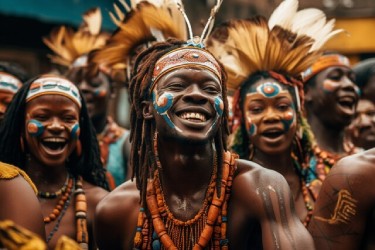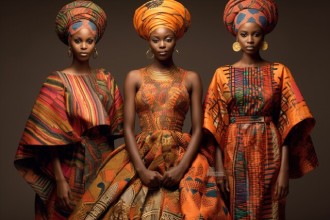Culture in Motion - How Africans Speak, Live, Believe, Dress, Dine, and Dance
Africa is a continent that is ever-evolving when it comes to culture. It has hundreds of languages and hundreds of ethnic groups, so it is a continent with traditions rooted. From the principles that run daily life to fashion, delicious food, and lively music, African culture is always on the move.
Here, we will discuss and explore how Africans talk, live, believe, dress, eat, and dance, highlighting how their vibrant culture is always on the move, never standing still, and full of life.
Africa's Ethnic Tapestry and Tower of Tongues
Africa has over 3000 ethnic groups, and each of them has its own culture and traditions. There are Maasai in Kenya, Yoruba in Nigeria, and Zulu in South Africa, among others, which create immense cultural diversity in Africa.
Africa's linguistic diversity is one of the most surprising facts about Africa. It is one of the most linguistically varied regions of the world since it has over 2,000 languages. The majority of the languages, including Swahili and Hausa, have millions of speakers and cover multiple countries. There are, however, many local languages in Africa like Xhosa in Southern Africa and Amharic in Ethiopia.
These ethnic groups and languages constitute the life of Africans, one that preserves culture and unites people in one common manner.
Faith in Every Footstep – Belief Systems That Shape African Life

Religion in Africa is deeply embedded in everyday life. It is not only what people believe but how they live, celebrate, and interact with the physical and spiritual realms. Just like Africa's people, its religions are incredibly diverse.
Across the continent, Christianity and Islam are the most widely practised religions. Mosques and churches are numerous in towns and cities, where believers gather for prayer. They have impacted a significant portion of African society.
African traditional religions, nonetheless, are quite present in many regions. These belief systems have been passed down through generations. In West Africa, for instance, the Yoruba people believe in Orisha, supernatural beings who are believed to control the natural forces. A certain responsibility is assigned to each Orisha, such as providing rain, protecting humans or healing the sick.
So, whether it's through church hymns on Sunday, the morning call to prayer, or moments of silence at a shrine, religion and beliefs set the rhythm of life across Africa.
How African Fashion Tells a Cultural Story

African fashion is not just what one wears but how one tells their story. Clothing is extremely significant and usually depicts one's origin and class. Fashion varies with every ethnic group and is inherited from generation to generation.
For example, the Ghanaian Kente cloth is colorful. It is worn on ceremonial occasions and represents royalty and respect. The Shweshwe cloth is worn by South African women proudly, especially during cultural ceremonies. Its designs narrate their pride in heritage.
Habesha Kemis in Ethiopia is a white embroidered dress that is worn for ceremonial purposes alone. In Nigeria, Aso Ebi is a way of uniting people. Family and friends wear similar clothes at parties and weddings to show love and unity.
Fashion on the continent constantly changes, yet never breaks away from its heritage. Now, its designers mesh yesterday and today in order to infuse culture into every seam, every design.
The Flavors That Unite Africa
Food in Africa is used to unite people. Every region has its peculiar taste and modes of cooking, all of which are determined by history and local traditions.
In West Africa, dishes like jollof rice, cooked using spices and rice, are adored in various countries. It is often served at parties and in family meetings. Fufu, a soft dough made from cassava or yam, is also popular and served with flavorful soups.
In North Africa, meals are full of spices and influences from Arab cultures. The couscous, which is usually consumed with vegetables and meat, is a staple. Tagine in Morocco, for example, has a lot of flavours.
East Africa has meals like injera in Ethiopia. You will find ugali, a maize-based dish in Kenya and Tanzania, served with grilled meat. Down in Southern Africa, people eat meals such as pap, braai and stews made from the local vegetables and meats.
No matter where you go in Africa, food tells a story of heritage and the joy of sharing a meal with others.
The Soundtrack of African Culture
If there's one thing that brings African culture to life, it's music. Across the continent, it's part of everyday life. Music is a universal language that speaks to everyone regardless of where they come from.
In West Africa, you'll be able to hear drums beating in the rhythm and joyful rhythms of Afrobeats. Artists like Fela Kuti and Burna Boy have taken African music to the world stage. In South Africa, music genres such as Amapiano add life to parties and clubs, while traditional Zulu songs continue to echo in cultural events.
Over in North Africa, Berber music and Gnawa rhythms blend the African and Arab sounds to form spiritual melodies. In the East of Africa, Benga from Kenya and Taarab from Tanzania combine local instruments, which shows that traditions can change over the course of time.
Whether it is sung, drummed or danced to, music in Africa has an impact. It unites and maintains the culture and makes it flourish.
Wrap Up
African culture is alive. It is dynamic and continues to change and evolve. From how individuals speak, believe, dress, eat and dance, everything is a story of who they are and where they come from.
Africa contains more than 2,000 languages, one of the most diverse continents in the world. This diversity expresses itself in its colorful clothing, delectable foods, great music, and profound beliefs.
African culture is continuously in motion. And that is what is so special about it, it doesn't stop. It just keeps growing, evolving, and inspiring.
